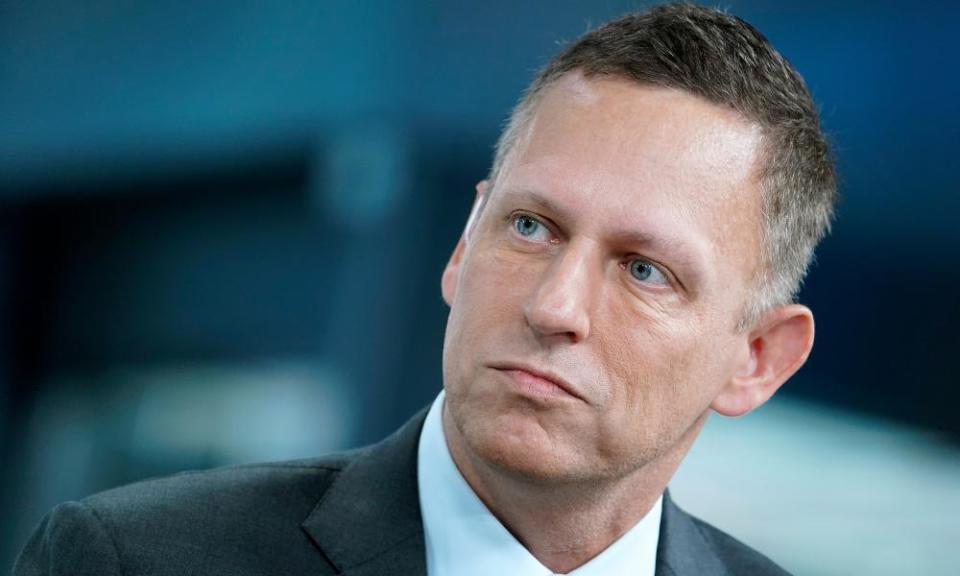Palantir’s Peter Thiel: NHS is a natural target for outspoken tech billionaire

Peter Thiel likes to say “the unpopular thing”, according to his biographer, so the NHS would be a natural target for the outspoken tech billionaire.
The co-founder of Palantir, which has just secured a £330m NHS data contract, was in full libertarian mode when discussing the health service in January. “Highways create traffic jams, welfare creates poverty, schools make people dumb and the NHS makes people sick,” he said.
Speaking at the Oxford Union debating society, he also said the British public’s affection for the NHS was a case of “Stockholm syndrome” – the term for hostages who feel a bond with their captors. Palantir, already a well-established supplier to the NHS, now has an even closer relationship with the organisation.
Related: NHS data platform may be undermined by lack of public trust, warn campaigners
Palantir, a company Thiel still chairs, immediately distanced itself from the comments and said he was making them as a “private individual”. But they were a standard intervention from an entrepreneur who takes an outspoken position on the right of the political spectrum.
“Thiel is very committed to the idea of being able to say the unpopular thing,” said Max Chafkin, the author of a recent biography of Thiel, titled The Contrarian, in an interview with Time magazine.
The 56-year-old supported Donald Trump’s election campaign in 2016 – in an address to the Republican national convention that year he said “I am proud to be gay” – and has backed rightwing candidates in US elections. He is a backer of cryptocurrencies and has accused a “finance gerontocracy” including Warren Buffett – the “sociopathic grandpa from Omaha”– of hindering bitcoin’s progress.
So it was ideologically consistent, albeit politically awkward from Palantir’s point of view, for Thiel to say the NHS needed an approach where “you just rip the whole thing from the ground and start over” – including the embrace of “market mechanisms”.
Thiel was born in Frankfurt, Germany, in 1967 and his family moved to Cleveland, Ohio, when he was one year old, before moving to Africa for a period and then settling in California. He graduated from Stanford law school and co-founded PayPal in 1998, merging the company with Elon Musk’s X.com online bank before selling the business to eBay for $1.5bn. Thiel was also the first external investor in Mark Zuckerberg’s Facebook, putting $500,000 into the company in 2004 and making more than $1bn from his shareholding (Thiel is now worth more than $9bn, according to the Bloomberg billionaires index).
By this time his politics were well-established, having launched the conservative Stanford Review at university and co-authoring a piece in the Wall Street Journal that referred to a “mindless” multicultural movement at Stanford.
However, the 9/11 attacks were formative for the next step in Thiel’s viewpoint. According to Chafkin, he became fixated on Islamic terrorism and developed hardened views on immigration. This also led to the creation of Palantir as a tool to “reduce terrorism while preserving civil liberties”, by processing and spotting patterns or connections in vast amounts of data. Early funders included In-Q-Tel, the venture capital arm of the Central Intelligence Agency, the US foreign intelligence service.
Thiel’s choice of corporate name reflects another of his interests. He was a keen reader of science fiction in his youth and has read Lord of the Rings numerous times. Palantir is named after the all-seeing crystal balls that appear in JRR Tolkien’s epic.
The $50bn company’s clients include several US public sector bodies, from the army to the Internal Revenue Service and, most controversially, the Immigration and Customs Enforcement agency. In 2020, Palantir’s chief executive, Alex Karp, said: “It’s a de minimis part of our work, finding people in our country who are undocumented.”
Karp is a supporter of Joe Biden but he has echoed Thiel’s contrarian sentiments, saying the company seems to share “fewer and fewer of the technology sector’s values and commitments”.
To underline the point, Palantir moved its headquarters from California to Denver, Colorado. But Thiel, the Silicon Valley outsider, has found success from being inside companies and organisations that need his firm’s services.

 Yahoo Finance
Yahoo Finance 